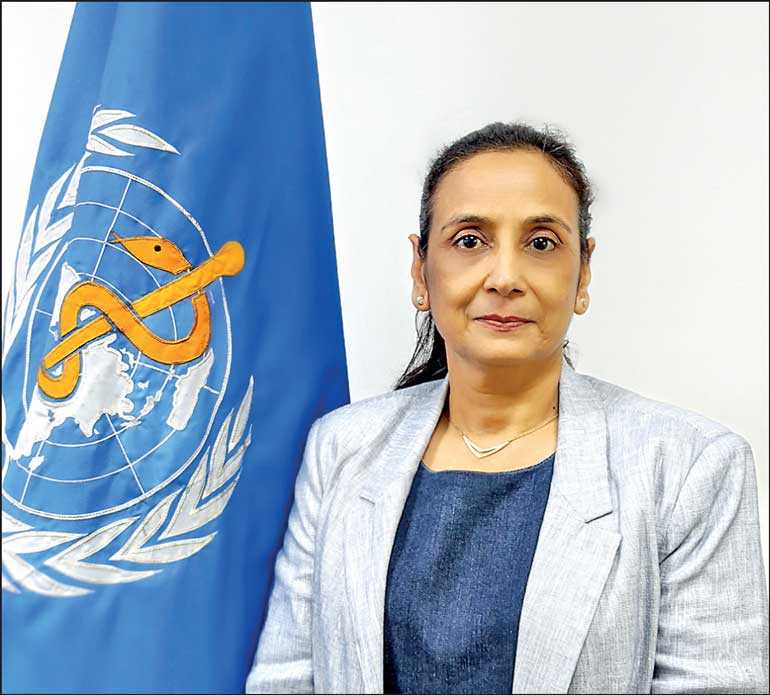Saturday Feb 28, 2026
Saturday Feb 28, 2026
Friday, 21 February 2020 00:00 - - {{hitsCtrl.values.hits}}

Sri Lanka ranks 68 in a new global index of 180 countries, comparing performance on child flourishing, estimated using measures including child survival and well-being, such as health, education, and nutrition; sustainability, using greenhouse gas emissions as a proxy, and equity indicated by country income gaps.
The report finds that no single country is adequately protecting children’s health, their environment and their futures, finds a landmark report released today by a Commission of over 40 child and adolescent health experts from around the world. The Commission was convened by the World Health Organization (WHO), UNICEF and The Lancet.
The report, ‘A Future for the World’s Children?’, finds that the health and future of every child and adolescent worldwide is under immediate threat from ecological degradation, climate change and exploitative marketing practices that push heavily processed fast food, sugary drinks, alcohol and tobacco at children.
Sri Lanka’s ranking represents the substantial progress the country has made in advancing child and maternal survival including greater access to health services and a drastic reduction of mortality rates for children under 5, while also achieving almost universal primary school attendance for boys and girls across the country. Further, Sri Lanka is among the only countries on track to beat CO2 emission per capita targets by 2030, while also performing fairly (within the top 70 countries) on child flourishing measures along with Albania, Armenia, Grenada, Jordan, Moldova, Tunisia, Uruguay and Viet Nam.
However, the report also highlights the distinct threat posed to children from harmful marketing. In Sri Lanka, of all food and beverage related advertisements, 78% were child-focused, and of these 74% claimed health benefits, many of which were unsupported. Children’s exposure to commercial marketing of junk food and sugary beverages is associated with the purchase of unhealthy foods and overweight and obesity, linking predatory marketing to the alarming rise in childhood obesity. The number of obese children and adolescents increased from 11 million in 1975 to 124 million in 2016 – an 11-fold increase, with dire individual and societal costs.
“Sri Lankan can be proud of its ranking but it is clear that it needs to go further by addressing the many challenges facing our children,” said UNICEF Representative for Sri Lanka Tim Sutton. “We know that the President has committed to addressing many of the critical issues facing children including malnutrition, quality education and climate change. UNICEF will continue to support the Government and people Sri Lanka to turn these commitments into actions taken for children across the country,” he said.
WHO Representative to Sri Lanka Dr. Razia Pendse noted, “Sri Lanka has made significant advances in child health over the past few decades and should be proud of the progress gained; however, as this report highlights, continued efforts are needed to secure a bright future for our youngest citizens. Investing in the health and development of children and adolescents bring benefits that last throughout the lifespan and across generations. Given the fact that a third of Sri Lankans are under 19 years old, prioritising youth-focused programming is essential. WHO will continue to work with the national program and key stakeholders to translate evidence including those highlighted in this report, into policy and practice that will further strengthen the Government’s resolve to invest in our children for a secure future.”
According to the report, while the poorest countries need to do more to support their children’s ability to live healthy lives, excessive carbon emissions – disproportionately from wealthier countries – threaten the future of all children. If global warming exceeds 4°C by the year 2100 in line with current projections, there will be devastating health consequences for children, due to rising ocean levels, heatwaves, the proliferation of diseases like malaria and dengue, and malnutrition.
The index shows that children in Norway, the Republic of Korea, and the Netherlands have the best chance at survival and well-being, while children in Central African Republic, Chad, Somalia, Niger and Mali face the worst odds. However, when authors took per capita CO2 emissions into account, the top countries trail behind: Norway ranked 156, the Republic of Korea 166, and the Netherlands 160. Each of the three emits 210% more CO2 per capita than their 2030 target. The United States of America (USA), Australia, and Saudi Arabia are among the ten worst emitters.
A manifesto for immediate action on child and adolescent health
To protect children, the independent Commission authors call for a new global movement driven by and for children. Specific recommendations include:
Stop CO2 emissions with the utmost urgency, to ensure children have a future on this planet;
In Sri Lanka UNICEF is calling for prioritising the conversation and restoration of forests, wetlands and other ecosystems that absorb large quantities of carbon, and specifically increase Sri Lanka’s forest coverage by 10%.
Place children and adolescents at the centre of our efforts to achieve sustainable development;
In Sri Lanka UNICEF is calling for new policies and investment in all sectors to work towards child health and rights; and implementation of the Multisectoral Action Plan for Nutrition.
Incorporate children’s voices into policy decisions;
Tighten national regulation of harmful commercial marketing, supported by a new Optional Protocol to the UN Convention on the Rights of the Child.
In September 2019, marking the 30th anniversary of the UNCRC, Sri Lanka became the first country in South Asia to recommit to the CRC on behalf of its children.
(To read the full report visit, ‘A Future for the World’s Children?’)